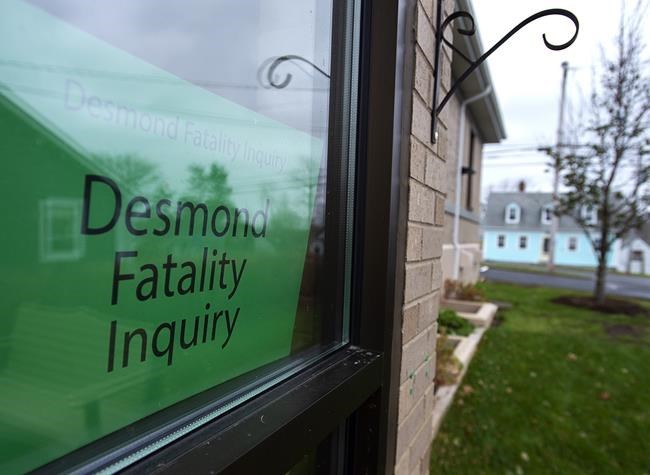PORT HAWKESBURY, N.S. — Nova Scotia's Health Department should consider ordering an independent review of how it serves Black people, a government official told an inquiry Tuesday.
Wayne Hamilton, executive director of African Nova Scotian Affairs for the province, made the suggestion during his testimony before an inquiry investigating why in early 2017 former soldier Lionel Desmond killed his family and himself — all of whom were Black.
"Maybe this should be the time," Hamilton said. "It would be beneficial."
Hamilton said the department should follow the approaches taken by the province's Education Department and by the College of Physicians and Surgeons of Nova Scotia, both of which launched reviews of how they serve people of African descent.
The Health Department should be subjected to an independent review because it is falling behind when it comes to serving racialized groups, he said.
"It takes a lot of courage," Hamilton testified. "They may not like what they find."
The provincial fatality inquiry heard Monday that Desmond, who suffered from post-traumatic stress disorder and depression, faced systemic racism when he reached out to health-care professionals as his mental health declined in late 2016.
Robert Wright, a sociologist who specializes in mental health, trauma and cultural competency, told the inquiry Monday that previous testimony from health-care professionals failed to account for the impact of systemic racism, which can often be subtle and unintentional.
Wright said the clinicians Desmond dealt with were not inherently racist. But he said the places where they worked, the schools they attended and the professional development they were exposed to "left them devoid" of insight into systemic racism.
On Tuesday, Hamilton said the Health Department is "falling short when it comes to some of the racialized groups," and he said the department is "not as advanced" in that area, when compared with the Education Department and the province's doctors.
In December 2009, a report examining the effectiveness of educational programs and supports for African Nova Scotian students was presented to the Education Department. The report included 30 recommendations.
And in May 2014, the department started an internal review to strengthen services for African Nova Scotian students. The department committed to examining the roles, responsibilities and governance of organizations to identify what services can be improved.
Those reviews followed the implementation of a landmark document from the Black Learners Advisory Committee submitted in 1994. The report included recommendations to eliminate institutional racism in the education system and to improve opportunities for African Nova Scotians.
As for the province's physicians and surgeons, in June their governing body asked former provincial ombudsman Douglas Ruck to lead a five-person independent commission that will identify examples of anti-Black racism in the college's policies and procedures.
The commission will also review operations to improve cultural competence, equity, diversity and inclusion.
Ruck was also asked to complete similar work for the Nova Scotia Barristers' Society.
On Jan. 3, 2017, Desmond legally bought a semi-automatic rifle, dressed in camouflaged clothing and fatally shot his wife, Shanna; their 10-year-old daughter, Aaliyah; and his mother, Brenda, in the family's home in Upper Big Tracadie, N.S.
This report by The Canadian Press was first published Nov. 30, 2021.
— By Michael MacDonald in Halifax.
The Canadian Press




